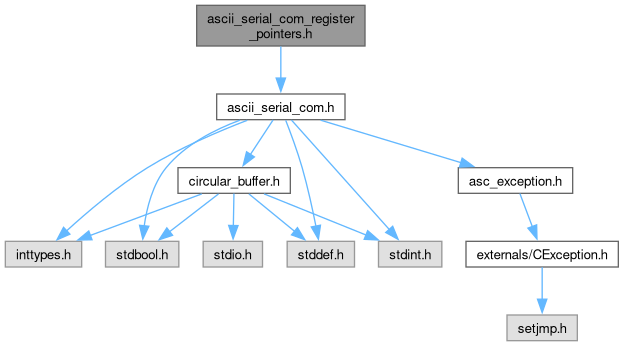ASCII Serial Com Register Pointers. More...
#include "ascii_serial_com.h"

Go to the source code of this file.
Classes | |
| struct | ascii_serial_com_register_pointers_struct |
| ASCII Serial Com Register Pointers State struct. More... | |
Macros | |
| #define | REGWIDTHBITS 8 |
| #define | REGWIDTHBYTES 1 |
| #define | REGTYPE uint8_t |
| #define | REGPRINTTYPEINT PRIu8 |
| #define | REGPRINTTYPEHEX PRIX8 |
Typedefs | |
| typedef struct ascii_serial_com_register_pointers_struct | ascii_serial_com_register_pointers |
| ASCII Serial Com Register Pointers State struct. | |
Functions | |
| void | ascii_serial_com_register_pointers_init (ascii_serial_com_register_pointers *register_pointers_state, volatile REGTYPE **pointers, REGTYPE *write_masks, uint16_t n_regs) |
| ASCII Serial Com Register Pointers init. | |
| void | ascii_serial_com_register_pointers_handle_message (ascii_serial_com *asc, char ascVersion, char appVersion, char command, char *data, size_t dataLen, void *register_pointers_state) |
| ASCII Serial Com Register Pointers handle message. | |
Detailed Description
ASCII Serial Com Register Pointers.
Register interface for devices.
This interface contains an array of pointers, so that each message address points to an arbitrary address. Additionally, a write mask controls which bits of the pointed to words are writable.
You probably want to create the array of pointers like:
#define NREGS 6
REGTYPE * reg_pointers[NREGS] = {
&x,
&y,
&z,
NULL,
NULL,
NULL
};
REGTYPE reg_write_masks[NREGS] = {
0,
0x3,
0xFF,
0,
0,
0
}
ascii_serial_com_register_pointers_init(&rps,reg_pointers,reg_write_masks,NREGS);
Convenience Macros
A set of convenience macros are provided to ease the common use of ascii_serial_com_register_pointers with ascii_serial_com_device.
Required Macros
To use the macros:
- Declare the register pointer and register write mask array as above
- Before the main() function, put
DECLARE_ASC_DEVICE_W_REGISTER_POINTERS()on a line with no semicolon - In the setup portion of main(), before the polling loop, inside a Try/Catch block, put:
SETUP_ASC_DEVICE_W_REGISTER_POINTERS(reg_map,reg_write_masks, NREGS);, where the variables are declared as in the previous section. - Inside the polling loop and a Try/Catch block, put:
HANDLE_ASC_COMM_IN_POLLING_LOOP(USART1);, replacing USART1 with the appropriate USART.
Number 4 assumes something is putting received bytes into a circular_buffer_uint8 called extraInputBuffer (declared and setup by the macros). This can be accomplished using, for STM32, def_usart_isr_push_rx_to_circ_buf(<usart_isr>,<usart>,&extraInputBuffer) (no semicolon)
Streaming
The boolean valued macro READY_TO_STREAM_ASC_DEVICE_W_REGISTER_POINTERS should be checked before actually streaming a message. and STREAM_TO_HOST_ASC_DEVICE_W_REGISTER_POINTERS(data,data_len); should be run to send the message.
The macros define a bool streaming_is_on that is initialized to false, set to true when a "n" message is received, and set to false when a "f" message is received. It should be used to decide when to start auxiliary routines that prepare to stream messages.
Definition in file ascii_serial_com_register_pointers.h.
Macro Definition Documentation
◆ REGPRINTTYPEHEX
| #define REGPRINTTYPEHEX PRIX8 |
Definition at line 84 of file ascii_serial_com_register_pointers.h.
◆ REGPRINTTYPEINT
| #define REGPRINTTYPEINT PRIu8 |
Definition at line 83 of file ascii_serial_com_register_pointers.h.
◆ REGTYPE
| #define REGTYPE uint8_t |
Definition at line 82 of file ascii_serial_com_register_pointers.h.
◆ REGWIDTHBITS
| #define REGWIDTHBITS 8 |
Definition at line 80 of file ascii_serial_com_register_pointers.h.
◆ REGWIDTHBYTES
| #define REGWIDTHBYTES 1 |
Definition at line 81 of file ascii_serial_com_register_pointers.h.
Typedef Documentation
◆ ascii_serial_com_register_pointers
ASCII Serial Com Register Pointers State struct.
Keeps track of the state of the ASCII Serial Com Register Pointers
Function Documentation
◆ ascii_serial_com_register_pointers_handle_message()
| void ascii_serial_com_register_pointers_handle_message | ( | ascii_serial_com * | asc, |
| char | ascVersion, | ||
| char | appVersion, | ||
| char | command, | ||
| char * | data, | ||
| size_t | dataLen, | ||
| void * | register_pointers_state ) |
ASCII Serial Com Register Pointers handle message.
This is the function passed to ascii_serial_com_device as frw
The parameters are the same as in that function (and ascii_serial_com_get_message_from_input_buffer + register_pointers_state).
WILL CLOBBER data
- Parameters
-
register_pointers_state should be a pointer to an initialized ascii_serial_com_register_pointers
Definition at line 26 of file ascii_serial_com_register_pointers.c.
References ascii_serial_com_put_error_in_output_buffer(), ascii_serial_com_put_message_in_output_buffer(), convert_hex_to_uint16(), ascii_serial_com_register_pointers_struct::n_regs, ascii_serial_com_register_pointers_struct::pointers, and ascii_serial_com_register_pointers_struct::write_masks.
◆ ascii_serial_com_register_pointers_init()
| void ascii_serial_com_register_pointers_init | ( | ascii_serial_com_register_pointers * | register_pointers_state, |
| volatile REGTYPE ** | pointers, | ||
| REGTYPE * | write_masks, | ||
| uint16_t | n_regs ) |
ASCII Serial Com Register Pointers init.
Initialize ASCII Serial Com register_pointers
- Parameters
-
register_pointers_state should be an uninitialized ascii_serial_com_register_pointers object pointers points to an array of pointers to registers (entries may be NULL). It's volatile so that it can point to device registers without reads/writes to them being optimized out. an array of write masks. Every one bit in these masks is a bit that may be written to the registers. n_regs is the number of registers in the pointers (not necessarily the number of bytes)
Definition at line 18 of file ascii_serial_com_register_pointers.c.
References ascii_serial_com_register_pointers_struct::n_regs, ascii_serial_com_register_pointers_struct::pointers, and ascii_serial_com_register_pointers_struct::write_masks.